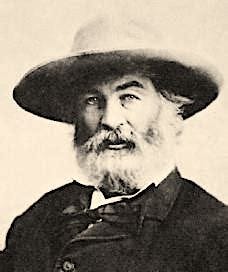I’d never before encountered a work of art about which I felt that to write, to pick apart and analyze, would be a disservice. Normally, when I write about a book, story, or song, it is an act of love. I feel as though I am adding to it in some way, enhancing a reader’s experience. Lately, though, I’ve come to question this. Perhaps it is better to leave a work of art alone rather than to tamper with it. Or perhaps there is just something unique about brilliant poetry.
A couple of weeks ago, I picked up Walt Whitman’s Leaves of Grass. This was a bit of a departure for me—the first real book of poetry that I’d ever attempted to read. I bought it on a whim after stumbling upon it in a local bookstore while browsing. My interest in Whitman had piqued only two days earlier, when I saw him mentioned in the poetic dedication of G.K. Chesterton’s novel The Man Who Was Thursday, titled “To Edmund Clerihew Bentley.” I saw something special in this poem (which can be read here), and it struck me that there might be something special about Leaves of Grass, too.
My copy is simple and elegant. Its cover is mostly white, with the book’s title and author written in green cursive letters. Its pages are thin and delicate; they feel nearly as thin as Bible pages and thus nearly as sacred. And in these pages I found a profound truth that I spend my life seeking, which always lives somewhere below my mind but is never consciously expressed. “In Cabin’d Ships at Sea,” “Eidólons,” “Me Imperturbe”—these are just some standouts among a collection without a single wasted word.
I read the pages slowly, rereading often, advancing a little bit each day. While reading, I perceived the familiar pangs of an urge I can never suppress for long: Write about it. Write about it! This is brilliant. Make it yours. I abandoned the idea quickly each time. It seemed impossible to write about any of Whitman’s poems without diminishing their meaning. Every word, every sound is delicately placed. Each poem’s meaning seems to approach you from behind, wrap its whole body around you without making it clear exactly where it came from. To rephrase such a thing would be a tragedy. How does one begin to summarize the perfect wisdom of “Eidólons”? A mere attempt would be ironic, would miss the whole point of the poem (or, rather, it might encapsulate the point quite perfectly). Thus, I decided to keep Walt Whitman’s name out of my writing, to keep his poetry as a little treat just for me.
Today, though, I read “Starting from Paumanok”: the first ‘long’ poem contained in Leaves of Grass. I felt some resistance upon starting it. Spanning twelve pages, it was the longest poem I’d ever attempted to read. I worried that my attention would wane, that boredom might spoil Whitman’s magic.
I was wrong. The poem moved me. It addressed birth, death. Who we are. Where we come from. Where we’re going. It addressed freedom. Purpose. Love. Whitman captured the value of a human life, of brotherhood (and sisterhood), of life, of the Earth itself—all in one poem. For its scope, the piece seems short. Once again, I will refrain from ‘analyzing’ it. I will not include any quotations, any interpretations. I won’t even share with you the vivid images that the poem brought to my mind. It’s too subjective, too variable. A stain on the poem’s grace. I will only say that I felt good after reading it. Light.
I sent a few excerpts from the poem to Will, which addressed some questions that had been clouding his mind in the past several weeks. I thought that the poem might bring him peace. It was this action that inspired me to write about Leaves of Grass today. I realized that an analysis was unnecessary. The book has power; it can speak for itself. My goal is to urge you to read it.
I will leave you with one poem that I am constantly reminded of as I read Whitman’s work:
Poets to Come
Poets to come! orators, singers, musicians to come!
Not to-day is to justify me and answer what I am for,
But you, a new brood, native, athletic, continental, greater than before known,
Arouse! for you must justify me.
I myself but write one or two indicative words for the future,
I but advance a moment only to wheel and hurry back in the darkness.
I am a man who, sauntering along without fully stopping,
turns a casual look upon you and then averts his face,
Leaving it to you to prove and define it,
Expecting the main things from you. It is appropriate that he refers to poets as ‘singers,’ and ‘musicians,’ that the phrase ‘I sing,’ appears in his poetry in lieu of the phrase ‘I write,’ that he refers to his poems as ‘songs.’ His writing has the elusive character of music. It transcends the words that it is made up of, morphs in its reader’s mind into something indescribable and complete. He is a bard (a word he actually uses in “Starting from Paumanok”), a genius.
It almost seems unreal to me that such a legend was once living, breathing, writing (or singing) these incredible works of art over a century ago. These poems sound like they could have been written yesterday. They do not age the way most pieces of writing do. They are humbling to read, and yet they were written by a humble man. Perhaps he really was tapping into some greater creative energy, a universal haven that all artists can reach if they only know how. Perhaps his work is showing us the way.
Thank you, Walt Whitman.
Let’s all carry the torch.
Let’s start a dialogue. What are your thoughts on Walt Whitman? Which artists inspire you?



